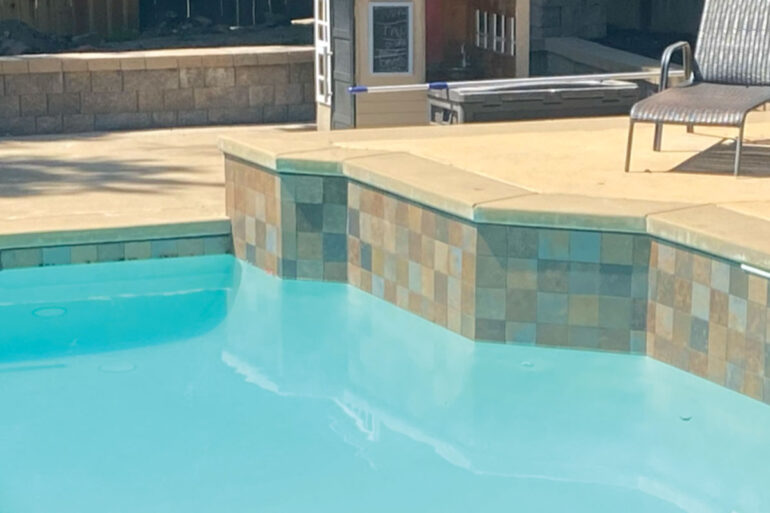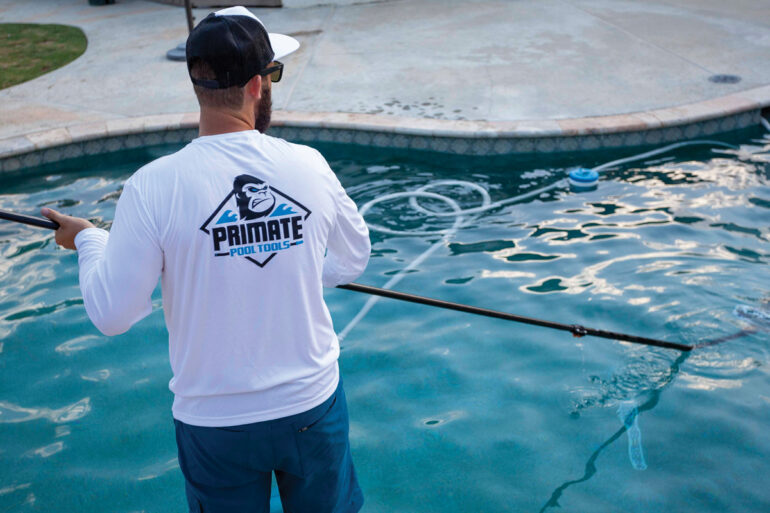Tools of the Trade

They say a good carpenter never blames his tools — but great pool techs certainly depend on them. From repurposing standard equipment for new and imaginative purposes to using their tools to build their businesses and bolster their reputations, the best in the industry treat their tools as extensions of themselves.
The Top Tool: A Store on Wheels
For John Migliaccio of The Pool and Spa Place in New Jersey, the most important tool is the one that gets you there.
“The pools don’t come to us,” Migliaccio says. “We have to go to the pools. That means you need a good service vehicle. Without it, nothing gets done.”
Migliaccio prefers Chevy, Ford and Dodge vans, and insists that his vehicles be “set up as a store.”
“This way,” he says, “regardless of what it is, you have enough parts on hand to fix the job and not have a go-back.”
They Don’t Call Them Smartphones for Nothing
Modern pool builders and service techs have at their disposal an almost supernaturally powerful tool that pros from previous generations couldn’t have imagined. In their pockets, they carry little rectangles made of metal and glass that — at the swipe of a finger — reveal the accumulated knowledge of the entire human race.
“If you get to a job and have no idea how to put an impeller in, you can YouTube it,” Migliaccio says.
To be fair, Migliaccio insists his techs be knowledgeable, credible, experienced and certified, but in a pinch, a smartphone makes a sturdy intellectual crutch.
“It’s nice to have on hand when you’re not sure what the setting should be on a heater,” he says.
Templates — and Tempramental Wind
For Mike Giovanone, owner of Concord Pools and Spas in Latham and Saratoga Springs, New York, the most valuable tool is comparatively small in technological might — but massive in size.
“If I had to name one irreplaceable construction aid, it would certainly be a pool template,” Giovanone says.
When his construction managers visit a yard before a build, they bring massive cutouts made from safety cover material to replicate the exact shape and size of the pool the customer is considering.
“It not only helps the project manager place the pool but it also gives the client a great representation of the pool they are contemplating,” Giovanone says.
After 30 years and 100 templates, the creative and low-tech tool has become indispensable.
“You can move them, flip them, twist them and turn them until it’s perfectly set,” Giovanone says. “I couldn’t imagine a pool layout being done without them.”
Like so much else with the pool service and construction industry, however, weather often has the final say in the outcome.
“The only downside is if it’s an extremely windy day,” Giovanone says, “I’ve had to chase a few down the block.”
Brooms and Power Washers: Service First
For Migliaccio, the most important tools help you serve the customer.
“What you’re providing is service, and you can’t forget that word,” Migliaccio says. “I tell my guys, ‘When you show up, take a picture in your mind of what the place looks like. When you leave, it’s got to look better.’ ”
For Migliaccio, that means never showing up without a broom and a power washer.
“When you open a pool, you want to power wash the cover and deodorize it so it doesn’t smell like rotten eggs when we bring it out to close in the fall,” Migliaccio says. “But while you have the power washer out, 90 percent of customers have a deck or concrete around the pool. I tell my guys, ‘You want to get a tip? Power wash the deck.’ Maybe the customer’s diving board is dirty because it’s been exposed all year to the snow and everything else. If you’ve got that power washer out, how long would it take you to hit that 8-foot diving board? Thirty seconds?”
Migliaccio has found that using tools to go the extra mile pays dividends down the road.
“Now we can say to the customer, ‘OK, we’re done. Not only did we clean and deodorize your cover, but we also cleaned the deck and the diving board was filthy, so we cleaned that up, too.’ That’s service. That’s why they call us again next season.”






